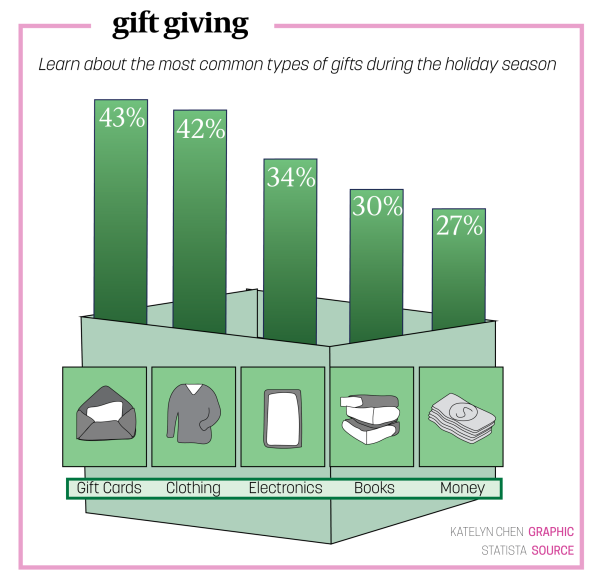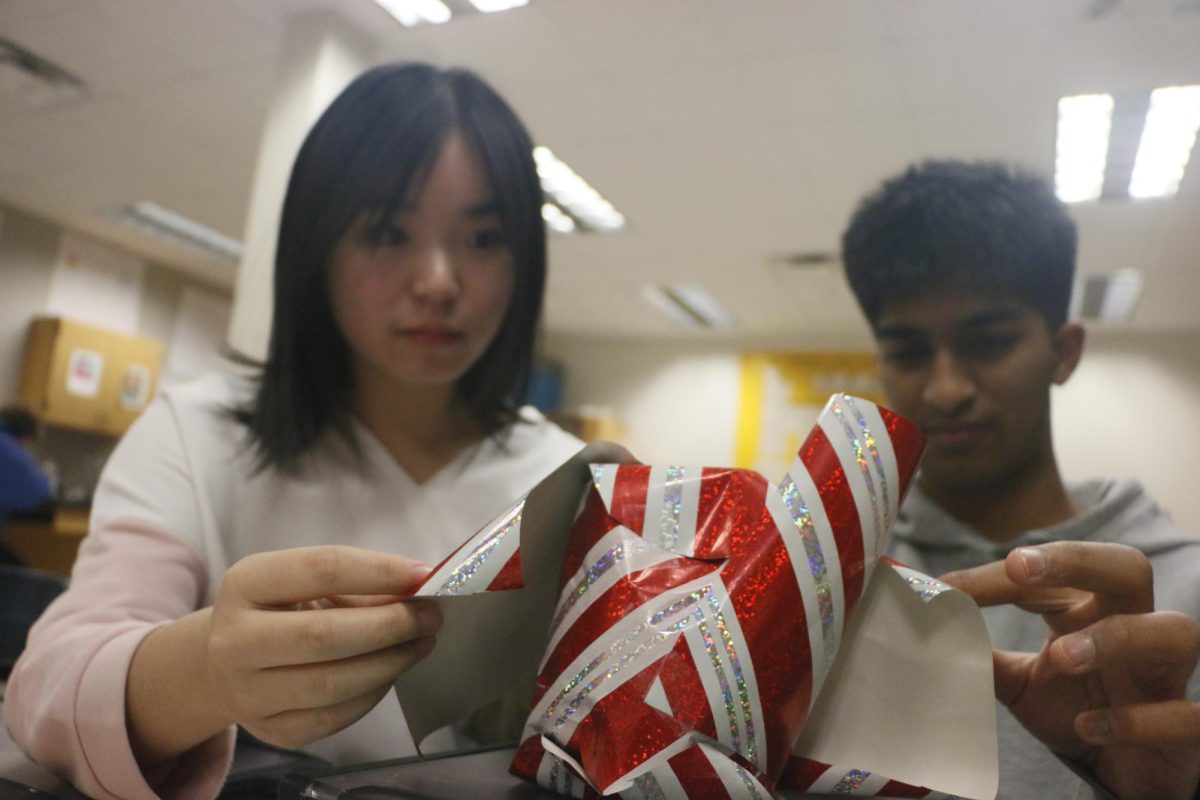As the holidays approach, gift-giving traditions become more prevalent in homes and communities worldwide. According to Statista, 52% of Gen-Z consumers were likely to give others self-made gifts this year. Any type of gift can carry significance, relying on the thought and intention behind it. No matter what they are, personalized gifts can carry a sense of care. Across cultures, thoughtful presents reflect the gift-giver’s dedication toward the recipient.
For sophomore Shivani Wadawadagi, making and giving gifts has always been important. She said she spends much time figuring out what to get someone.
“I normally give handmade gifts or a gift involving an inside joke to someone I know,” Wadawadagi said. “There’s something so endearing about opening a gift and seeing how that person pays attention to you.”
Additionally, she said even when she does not know someone well, she still tries to get them gifts they would appreciate.
“When I don’t know people as well or if I didn’t have that much time to put together a gift, I get pretty general things like plushies and jewelry,” Wadawagi said.
Although Sophomore Nikhil Murugan does not handmake his gifts, he said they are personalized nonetheless.
“For one of my friends, I once got him a chess-themed stuffed animal because he had recently,” Murugan said. “I have a lot of friends with similar interests, so it’s usually pretty easy to get them gifts.”
Additionally, Murugan said he still has fun holiday traditions with his friends and family, in the absence of handmade gifts.
“We do a white elephant type of game or Secret Santa,” Murugan said. “The Secret Santa was more of a joke, so we all got each other unserious items.”
Wadawadagi said personalized gifts can be more thoughtful than ones that are not hand-crafted.
“I think that personalized gifts are better, they just show a lot of thought and effort that make the gift-receiver feel special,” Wadawadagi said. “There’s nothing wrong with a more impersonal gift, but if I have the time I always try to make a personal gift.”
Adding to this, she said there are ways to make sure that her gifts always come off as attentive.
“I think the most important thing to personalize a gift is to pay attention to a person. if they’re mentioning how they really like this artist or band, make a note of it so you can get something later,” Wadawadagi said. “I also think a handmade card or little decorations are a perfect touch that makes a gift special.”
However, Wadawadagi said there are drawbacks to making handmade gifts for loved ones.

“I think it’s a challenge for me to commit to an idea. there’s a lot of pressure on giving the ‘perfect gift’ especially if it’s something I’m making,” Wadawadagi said. “I want to choose something perfect and that cripples my decision-making skills.”
Social worker Sara Knoop said each gift has a different impact on its receiver.
“I can tell you that gifts can often have a positive impact on the receiver and the giver. But for each person that gift can have a different impact,” Knoop said.
Murugan said he feels cheerful when both giving and receiving gifts.
“It makes me feel fulfilled because of how they seem happy after I give them the gift, and then I also get fun gifts too that I like,” Murugan said.
Wadawadagi said some of the gifts she received left a lasting impact on her.
“The most meaningful gift I’ve gotten was from my older sister. I like to crochet and I used to just keep all my yarn in a pile in my room, but last Christmas she got a cart and organized all my yarn for me,” Wadawadagi said. “It was very meaningful to me because it’s such a thoughtful gift; I use it every day and it’s so personalized to me.”
Murugan said he thinks monetary gifts are not as meaningful as handmade ones.
“I don’t care that much for gift cards,” Murugan said. “I know that they’re fun and all, but I like actual gifts more than a gift card.”
Knoop concurred with this, saying that every person has differing opinions on gifts.
“Every person is different in what means the most to them,” Knoop said. “Some people like tangible gifts, others like acts of service and some prefer time with their loved ones.”

































![AI in films like "The Brutalist" is convenient, but shouldn’t take priority [opinion]](https://hilite.org/wp-content/uploads/2025/02/catherine-cover-1200x471.jpg)









































![Review: “The Immortal Soul Salvage Yard:” A criminally underrated poetry collection [MUSE]](https://hilite.org/wp-content/uploads/2025/03/71cju6TvqmL._AC_UF10001000_QL80_.jpg)
![Review: "Dog Man" is Unapologetically Chaotic [MUSE]](https://hilite.org/wp-content/uploads/2025/03/dogman-1200x700.jpg)
![Review: "Ne Zha 2": The WeChat family reunion I didn’t know I needed [MUSE]](https://hilite.org/wp-content/uploads/2025/03/unnamed-4.png)
![Review in Print: Maripaz Villar brings a delightfully unique style to the world of WEBTOON [MUSE]](https://hilite.org/wp-content/uploads/2023/12/maripazcover-1200x960.jpg)
![Review: “The Sword of Kaigen” is a masterpiece [MUSE]](https://hilite.org/wp-content/uploads/2023/11/Screenshot-2023-11-26-201051.png)
![Review: Gateron Oil Kings, great linear switches, okay price [MUSE]](https://hilite.org/wp-content/uploads/2023/11/Screenshot-2023-11-26-200553.png)
![Review: “A Haunting in Venice” is a significant improvement from other Agatha Christie adaptations [MUSE]](https://hilite.org/wp-content/uploads/2023/11/e7ee2938a6d422669771bce6d8088521.jpg)
![Review: A Thanksgiving story from elementary school, still just as interesting [MUSE]](https://hilite.org/wp-content/uploads/2023/11/Screenshot-2023-11-26-195514-987x1200.png)
![Review: "When I Fly Towards You", cute, uplifting youth drama [MUSE]](https://hilite.org/wp-content/uploads/2023/09/When-I-Fly-Towards-You-Chinese-drama.png)
![Postcards from Muse: Hawaii Travel Diary [MUSE]](https://hilite.org/wp-content/uploads/2023/09/My-project-1-1200x1200.jpg)
![Review: "Ladybug & Cat Noir: The Movie," departure from original show [MUSE]](https://hilite.org/wp-content/uploads/2023/09/Ladybug__Cat_Noir_-_The_Movie_poster.jpg)
![Review in Print: "Hidden Love" is the cute, uplifting drama everyone needs [MUSE]](https://hilite.org/wp-content/uploads/2023/09/hiddenlovecover-e1693597208225-1030x1200.png)
![Review in Print: "Heartstopper" is the heartwarming queer romance we all need [MUSE]](https://hilite.org/wp-content/uploads/2023/08/museheartstoppercover-1200x654.png)




